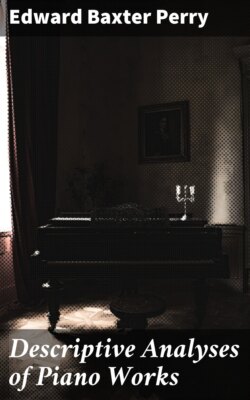Читать книгу Descriptive Analyses of Piano Works - Edward Baxter Perry - Страница 3
На сайте Литреса книга снята с продажи.
Introduction
ОглавлениеTable of Contents
The material comprised in the following pages has been collected for use in book form by the advice and at the earnest request of the publisher, as well as of many musical friends, who express the belief that it is of sufficient value and interest to merit a certain degree of permanency, and will prove of practical aid to teachers and students of music. A portion of it has already appeared in print in the program books of the Derthick Musical Literary Society and in different musical journals; and nearly all of it has been used at various times in my own Lecture Recitals.
The book is merely a compilation of what have seemed the most interesting and valuable results of my thought, reading, and research in connection with my Lecture Recital work during the past twenty years.
In the intensely busy life of a concert pianist a systematic and exhaustive study of the whole broad field of piano literature has been utterly impossible. That would require the exclusive devotion of a lifetime at least. My efforts have been necessarily confined strictly to such compositions as came under my immediate attention in connection with my own work as player.
The effect is a seemingly desultory and haphazard method in the study, and an inadequacy and incoherency in the collective result, which no one can possibly realize or deplore so fully as myself. Still the work is a beginning, a first pioneer venture into a realm which I believe to be not only new, but rich and important. I can only hope that the example may prompt others, with more leisure and ability, to follow in the path I have blazed, to more extensive explorations and more complete results.
Well-read musicians will find in these pages much that they have learned before from various scattered sources. Naturally so. I have not originated my facts or invented my legends. They are common property for all who will but seek. I have merely collected, arranged, and, in many instances, translated them into English. I claim no monopoly. On the other hand, they may find some things they have not previously known. In such cases I venture to suggest to the critically and incredulously inclined, that this does not prove their inaccuracy, though some have seemed to fancy that it did. Not to know a thing does not always conclusively demonstrate that it is not so.
To the general reader let me say that this book represents the best thought and effort of my professionally unoccupied hours during the past twenty years. It comes to you with my heart in it, bringing the wish that the material here collected may be to you as interesting and helpful as it has been to me in the gathering. The actual writing has mainly been done on trains, or in lonely hotel rooms far from books of reference, or aids of any kind; so occasional inexactitudes of data or detail are by no means improbable, when my only resource was the memory of something read, or of personal conversation often years before. With the limited time at my disposal, a detailed revision is not practicable, and I therefore present the articles as originally written. Take and use what seems of value, and the rest pass by.
The plan and purpose of the book rest simply upon the theory that the true interpretation of music depends not only on the player’s possession of a correct insight into the form and harmonic structure of a given composition, but also on the fullest obtainable knowledge concerning the circumstances and environment of its origin, and the conditions governing the composer’s life at the time, as well as any historical or legendary matter which may have served him as inspiration or suggestion.
My reason for now presenting it to the public is the same as that which has caused me to devote my professional life exclusively to the Lecture Recital—namely, because experience has proved to me that a knowledge of the poetic and dramatic content of a musical work is of immense value to the player in interpretation, and to the listener in comprehension and enjoyment of any composition, and because, except in scattered fragments, no information of just this character exists elsewhere in print.
It being, as explained, impossible to make this collection of analyses complete, or even approximately so, it has seemed wise to limit the number here included to just fifty, so as to keep the book to a convenient size. I have endeavored to select those covering as large a range and variety as possible, with the view of making them as broadly helpful and suggestive as may be.
It is my intention to continue my labors along this line so far as strength and opportunity permit, in the faith that I can devote my efforts to no more useful end.
Edward Baxter Perry.
